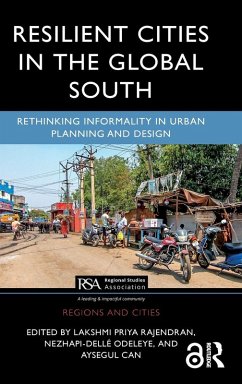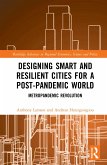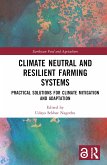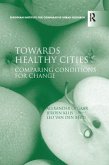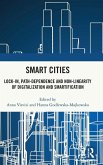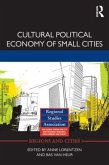Resilient Cities in the Global South
Rethinking Informality in Urban Planning and Design
Herausgeber: Rajendran, Lakshmi Priya; Can, Aysegul; Odeleye, Nezhapi-Dellé
Resilient Cities in the Global South
Rethinking Informality in Urban Planning and Design
Herausgeber: Rajendran, Lakshmi Priya; Can, Aysegul; Odeleye, Nezhapi-Dellé
- Gebundenes Buch
- Merkliste
- Auf die Merkliste
- Bewerten Bewerten
- Teilen
- Produkt teilen
- Produkterinnerung
- Produkterinnerung
This book adopts an interdisciplinary approach to examine how diverse social and spatial behaviours within informal urban environments, particularly in developing countries, can provide fresh insights for robust urban planning and development. It positions informality as a dialogue for enabling resilience.
Andere Kunden interessierten sich auch für
![Designing Smart and Resilient Cities for a Post-Pandemic World Designing Smart and Resilient Cities for a Post-Pandemic World]() Anthony LarssonDesigning Smart and Resilient Cities for a Post-Pandemic World168,99 €
Anthony LarssonDesigning Smart and Resilient Cities for a Post-Pandemic World168,99 €![Climate Neutral and Resilient Farming Systems Climate Neutral and Resilient Farming Systems]() Climate Neutral and Resilient Farming Systems149,99 €
Climate Neutral and Resilient Farming Systems149,99 €![Towards Healthy Cities Towards Healthy Cities]() Alexander OtgaarTowards Healthy Cities65,99 €
Alexander OtgaarTowards Healthy Cities65,99 €![Resilient Building Retrofits Resilient Building Retrofits]() Resilient Building Retrofits150,99 €
Resilient Building Retrofits150,99 €![Smart Cities Smart Cities]() Smart Cities206,99 €
Smart Cities206,99 €![Making Electricity Resilient Making Electricity Resilient]() Antti SilvastMaking Electricity Resilient58,99 €
Antti SilvastMaking Electricity Resilient58,99 €![Cultural Political Economy of Small Cities Cultural Political Economy of Small Cities]() Cultural Political Economy of Small Cities68,99 €
Cultural Political Economy of Small Cities68,99 €-
-
-
This book adopts an interdisciplinary approach to examine how diverse social and spatial behaviours within informal urban environments, particularly in developing countries, can provide fresh insights for robust urban planning and development. It positions informality as a dialogue for enabling resilience.
Produktdetails
- Produktdetails
- Verlag: Routledge
- Seitenzahl: 244
- Erscheinungstermin: 22. Juli 2025
- Englisch
- Abmessung: 240mm x 161mm x 18mm
- Gewicht: 534g
- ISBN-13: 9781032373775
- ISBN-10: 1032373776
- Artikelnr.: 73330518
- Herstellerkennzeichnung
- Libri GmbH
- Europaallee 1
- 36244 Bad Hersfeld
- gpsr@libri.de
- Verlag: Routledge
- Seitenzahl: 244
- Erscheinungstermin: 22. Juli 2025
- Englisch
- Abmessung: 240mm x 161mm x 18mm
- Gewicht: 534g
- ISBN-13: 9781032373775
- ISBN-10: 1032373776
- Artikelnr.: 73330518
- Herstellerkennzeichnung
- Libri GmbH
- Europaallee 1
- 36244 Bad Hersfeld
- gpsr@libri.de
Lakshmi Priya Rajendran is Associate Professor in Environmental and Spatial Equity, Bartlett School of Architecture, The Bartlett Faculty of Built Environment, University College London (UCL), UK. Nezhapi-Dellé Odeleye is Associate Professor in Urban Design & Planning, and MSc Planning Course Director, School of Engineering and Built Environment, Anglia Ruskin University (ARU), Chelmsford, UK. Aysegul Can is Postdoctoral Researcher in the Institute of Regional Studies, Karlsruhe Institute of Technology (KIT), Germany.
List of Figures. Acknowledgements. List of Contributors. Foreword By Nezar
AlSayyad. 1 Informality, resilience, and dialogue: Towards an alternative
southern framework. PART 1 North-South Relations. 2 A marginalised spatial
structure in Melbourne's public housing estates: Evaluating public spaces,
infrastructure, and citizen participation. 3 Accessing the city via
informal urbanism: Kampungs, multiculturalism, and kebabs. 4 Reporting from
the front: How socio-economic nonconformities revolutionise architecture as
a political act. 5 Re-conceptualising the relationship between
informalities, livelihoods, and governance towardsurban resilience. PART 2
Grassroots. 6 "Never let a good crisis go to waste": Lessons on dialogical
transformations of public agency and space. 7 Havana's informal
settlements: Strengthening resilience through grassroots infrastructures. 8
Resilient co-production of peripheral popular urbanisation in Buenos Aires
Metropolitan Region: The case of Guernica land reappropriation. PART 3
Institutional Strategies Professional Alliances. 9 Resilience to colonial
modernity: Shaping slum rehabilitations in Pune, India. 10 Urban
informality in the making: Public actors' spatial strategies in Gimpo,
South Korea. 11 Architecture of engagement: Site, action, and possibilities
for reinvention. 12 Revisiting social resilience in informal settlements:
The strength and the limits of Paraisópolis community action during the
COVID-19 pandemic in São Paulo. 13 Conceptual implications: An emerging
"urban informality dialogical framework"? Index.
AlSayyad. 1 Informality, resilience, and dialogue: Towards an alternative
southern framework. PART 1 North-South Relations. 2 A marginalised spatial
structure in Melbourne's public housing estates: Evaluating public spaces,
infrastructure, and citizen participation. 3 Accessing the city via
informal urbanism: Kampungs, multiculturalism, and kebabs. 4 Reporting from
the front: How socio-economic nonconformities revolutionise architecture as
a political act. 5 Re-conceptualising the relationship between
informalities, livelihoods, and governance towardsurban resilience. PART 2
Grassroots. 6 "Never let a good crisis go to waste": Lessons on dialogical
transformations of public agency and space. 7 Havana's informal
settlements: Strengthening resilience through grassroots infrastructures. 8
Resilient co-production of peripheral popular urbanisation in Buenos Aires
Metropolitan Region: The case of Guernica land reappropriation. PART 3
Institutional Strategies Professional Alliances. 9 Resilience to colonial
modernity: Shaping slum rehabilitations in Pune, India. 10 Urban
informality in the making: Public actors' spatial strategies in Gimpo,
South Korea. 11 Architecture of engagement: Site, action, and possibilities
for reinvention. 12 Revisiting social resilience in informal settlements:
The strength and the limits of Paraisópolis community action during the
COVID-19 pandemic in São Paulo. 13 Conceptual implications: An emerging
"urban informality dialogical framework"? Index.
List of Figures. Acknowledgements. List of Contributors. Foreword By Nezar
AlSayyad. 1 Informality, resilience, and dialogue: Towards an alternative
southern framework. PART 1 North-South Relations. 2 A marginalised spatial
structure in Melbourne's public housing estates: Evaluating public spaces,
infrastructure, and citizen participation. 3 Accessing the city via
informal urbanism: Kampungs, multiculturalism, and kebabs. 4 Reporting from
the front: How socio-economic nonconformities revolutionise architecture as
a political act. 5 Re-conceptualising the relationship between
informalities, livelihoods, and governance towardsurban resilience. PART 2
Grassroots. 6 "Never let a good crisis go to waste": Lessons on dialogical
transformations of public agency and space. 7 Havana's informal
settlements: Strengthening resilience through grassroots infrastructures. 8
Resilient co-production of peripheral popular urbanisation in Buenos Aires
Metropolitan Region: The case of Guernica land reappropriation. PART 3
Institutional Strategies Professional Alliances. 9 Resilience to colonial
modernity: Shaping slum rehabilitations in Pune, India. 10 Urban
informality in the making: Public actors' spatial strategies in Gimpo,
South Korea. 11 Architecture of engagement: Site, action, and possibilities
for reinvention. 12 Revisiting social resilience in informal settlements:
The strength and the limits of Paraisópolis community action during the
COVID-19 pandemic in São Paulo. 13 Conceptual implications: An emerging
"urban informality dialogical framework"? Index.
AlSayyad. 1 Informality, resilience, and dialogue: Towards an alternative
southern framework. PART 1 North-South Relations. 2 A marginalised spatial
structure in Melbourne's public housing estates: Evaluating public spaces,
infrastructure, and citizen participation. 3 Accessing the city via
informal urbanism: Kampungs, multiculturalism, and kebabs. 4 Reporting from
the front: How socio-economic nonconformities revolutionise architecture as
a political act. 5 Re-conceptualising the relationship between
informalities, livelihoods, and governance towardsurban resilience. PART 2
Grassroots. 6 "Never let a good crisis go to waste": Lessons on dialogical
transformations of public agency and space. 7 Havana's informal
settlements: Strengthening resilience through grassroots infrastructures. 8
Resilient co-production of peripheral popular urbanisation in Buenos Aires
Metropolitan Region: The case of Guernica land reappropriation. PART 3
Institutional Strategies Professional Alliances. 9 Resilience to colonial
modernity: Shaping slum rehabilitations in Pune, India. 10 Urban
informality in the making: Public actors' spatial strategies in Gimpo,
South Korea. 11 Architecture of engagement: Site, action, and possibilities
for reinvention. 12 Revisiting social resilience in informal settlements:
The strength and the limits of Paraisópolis community action during the
COVID-19 pandemic in São Paulo. 13 Conceptual implications: An emerging
"urban informality dialogical framework"? Index.

